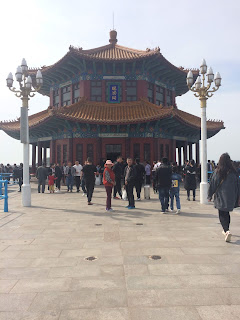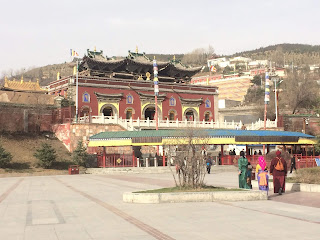Wow, I can't believe that in a few days it will be exactly a year since I began my journey to China. It's been about three months since coming back from China and I miss it very much. For this last blog post, I want to talk about the top five things that I'll miss about China and what I learned from my journey abroad.
Things I'll miss about China:
1. The food!
-I've come to really love Chinese food and even though I can make it myself or buy a version of it here. It will never be the same. My favorite food was probably jiaozi (饺子) or baozi (包子) but I also really enjoyed the duck. I'm going to try to make a duck for Thanksgiving so we will see how that goes. I've enjoyed most things that I've eaten while in China. Most recently, I've been craving 粥 which is a millet porridge that the Chinese eat for breakfast and that my host family would feed me. I also miss getting bubble tea for so cheap, but I've learned to make that here as well as buying it whenever I can. Just thinking about all of this food is making me hungry. Honorable mentions for delicious food items: everything from Jeff's cuisine, (my favorite restaurant in Beijing especially those Hunan potatoes) hotpot (火锅,especially the Xia Bu Xia Bu restaurant) Paomo (泡馍, bread and meat soup from Xi'an) tang yuan (汤圆) and every noodle dish ever.
2. My teachers!
-The teachers from my program were incredible and extremely helpful. All of them were so lovely and definitely gave me a positive experience in China. My Chinese teachers especially helped me gain confidence in my ability to speak Chinese and navigate China alone. They were always willing to help you even when they weren't in the office. They organized great trips that enhanced our experience and knowledge. When I go back to China, I would love to visit them again.
3. New friends!
-I made so many new friends both from America and from China that I'm going to miss dearly. My new Chinese friends helped me practice my Chinese as well taking me out to do fun things in the city. My American friends that I met in the program were great as well. I have so many great stories and memories that I made with the friends on my program. From first semester, I remember watching Riverdale ever night after a long day on the study trip and from the second semester, I remember the family dinners we would have and watching Game of Thrones in my dorm room together. Also all of the adventures that we went on while on the study trip. Shout out to my amazing roommates and everyone who made an impression no matter how big or small.
4. New experiences and the ability to travel!
-One of my favorite things about China is how easy it is to travel. I was able to just get on a train for relatively cheap and travel to a totally different province. While abroad, I managed to travel to all four corners of China and really get to see what and who makes up China. I went all the way north to Harbin, south to Yunnan, west to Tibet, and east to Qingdao or Shanghai. Each place was an unique experience and demonstrated just how different each province in China is. All the provinces have different dialects. Some of them are so different that you can't understand them even if you are very fluent in Mandarin. This makes learning Chinese an unique experience since every person you talk to and every place that you go may speak a different version of Chinese. China is always keeping you on your toes. Because I went to China, I was able to try many things that I never thought I would get the chance to do. I never thought that I would climb mountains, visit Tibet, see pandas, and many more things. I've learned so much about China and about myself. I definitely feel like a more confident individual and someone who is more willing to try new things. This is just one thing that I'm so thankful to China for. I can't wait to go back and learn more and I can't wait for others to travel to China and learn more about China and themselves.
5. My family and three old friends!
-The last thing that I'll miss (there are many more but here are just five) is my family. I'm so incredibly thankful for the opportunity to live with a host family. It makes it easier to want to visit China since I have a family waiting there for me. My host family was funny and kind and taught me more about China and Chinese people that you can't learn in a classroom. It was an unique experience to get to live with Chinese people and live a Chinese lifestyle. I'm not opposed to the Chinese lifestyle either. There are lots of naps, going for walks, and making delicious food together. Finally, I'll miss the three friends that inspired me to go to China and to start learning Chinese. We've always said that we are a family and I truly believe that. It doesn't matter that we are from places half way across the world from each other or don't share the same blood, they are my family, and I miss them so much. It's funny how you meet people in your life and you don't know the impact they will have on you yet. As my friend and sister Yihui said, "Life is a constant meeting and separation." I can't wait for the day when we are reunited with each other whether that be here in America, back in China, or a different country.
My first time in China may have come to an end, but I'm excited for everything that it has taught me and the experiences that I've had. I'm already planning my next trip. For all those who have ever thought about going to China, go! For all of those who have never thought about going to China, you should go too. You can learn so much by going to China, and I would be happy to be your guide.
Goodbye China. Until we meet again.
再见中国
马乐















































